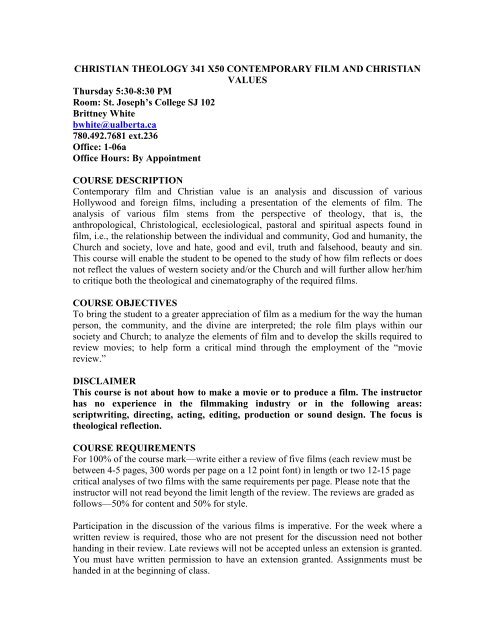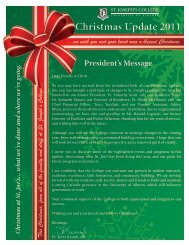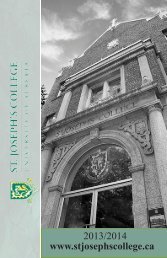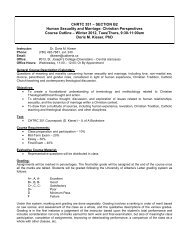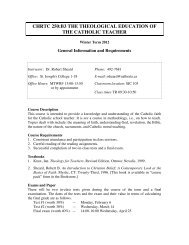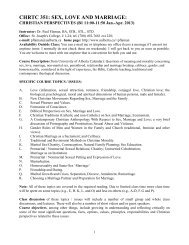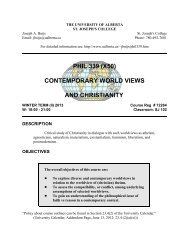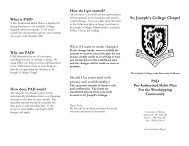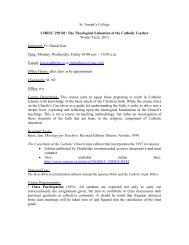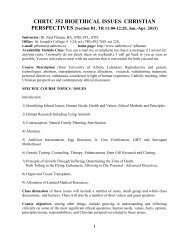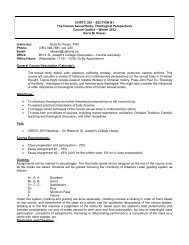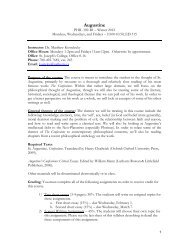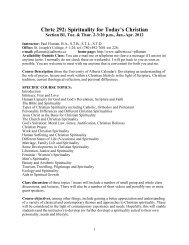CHRISTIAN THEOLOGY 341 X50 CONTEMPORARY FILM AND ...
CHRISTIAN THEOLOGY 341 X50 CONTEMPORARY FILM AND ...
CHRISTIAN THEOLOGY 341 X50 CONTEMPORARY FILM AND ...
Create successful ePaper yourself
Turn your PDF publications into a flip-book with our unique Google optimized e-Paper software.
<strong>CHRISTIAN</strong> <strong>THEOLOGY</strong> <strong>341</strong> <strong>X50</strong> <strong>CONTEMPORARY</strong> <strong>FILM</strong> <strong>AND</strong> <strong>CHRISTIAN</strong><br />
VALUES<br />
Thursday 5:30-8:30 PM<br />
Room: St. Joseph’s College SJ 102<br />
Brittney White<br />
bwhite@ualberta.ca<br />
780.492.7681 ext.236<br />
Office: 1-06a<br />
Office Hours: By Appointment<br />
COURSE DESCRIPTION<br />
Contemporary film and Christian value is an analysis and discussion of various<br />
Hollywood and foreign films, including a presentation of the elements of film. The<br />
analysis of various film stems from the perspective of theology, that is, the<br />
anthropological, Christological, ecclesiological, pastoral and spiritual aspects found in<br />
film, i.e., the relationship between the individual and community, God and humanity, the<br />
Church and society, love and hate, good and evil, truth and falsehood, beauty and sin.<br />
This course will enable the student to be opened to the study of how film reflects or does<br />
not reflect the values of western society and/or the Church and will further allow her/him<br />
to critique both the theological and cinematography of the required films.<br />
COURSE OBJECTIVES<br />
To bring the student to a greater appreciation of film as a medium for the way the human<br />
person, the community, and the divine are interpreted; the role film plays within our<br />
society and Church; to analyze the elements of film and to develop the skills required to<br />
review movies; to help form a critical mind through the employment of the “movie<br />
review.”<br />
DISCLAIMER<br />
This course is not about how to make a movie or to produce a film. The instructor<br />
has no experience in the filmmaking industry or in the following areas:<br />
scriptwriting, directing, acting, editing, production or sound design. The focus is<br />
theological reflection.<br />
COURSE REQUIREMENTS<br />
For 100% of the course mark—write either a review of five films (each review must be<br />
between 4-5 pages, 300 words per page on a 12 point font) in length or two 12-15 page<br />
critical analyses of two films with the same requirements per page. Please note that the<br />
instructor will not read beyond the limit length of the review. The reviews are graded as<br />
follows—50% for content and 50% for style.<br />
Participation in the discussion of the various films is imperative. For the week where a<br />
written review is required, those who are not present for the discussion need not bother<br />
handing in their review. Late reviews will not be accepted unless an extension is granted.<br />
You must have written permission to have an extension granted. Assignments must be<br />
handed in at the beginning of class.
Due Dates for Film Analysis:<br />
(A) If you choose 5 papers:<br />
(20%) January 24<br />
(20%) February 14<br />
(20%) March 07<br />
(20%) March 28<br />
(20%) April 18<br />
(B) If you choose 2 papers (You must be in your 3 rd or 4 th year to choose this option or<br />
have taken prior theology courses and have consent by the instructor)<br />
(50%) February 28<br />
(50%) April 18<br />
*Note: You must choose either option A or B you cannot choose both. I drink my coffee<br />
black- I don’t take half and half; meaning choose one or the other.<br />
<strong>FILM</strong>S<br />
The following films will be accepted for analysis: The Hunger Games, The Passion of the<br />
Christ, Blindness, City of God, Life is Beautiful, The Rite, Pan’s Labyrinth, Into The<br />
Wild, Psycho, The Fountain, The Motorcycle Diaries, Maria Full of Grace, Mother<br />
Teresa, The Squid and the Whale, The Virgin Suicides, The Lives of Others, The Life of<br />
Pi, Shawshank Redemption, 2081, The Hobbit (Any other film must be approved by the<br />
instructor).<br />
GRADING<br />
Marks for assignments, tests, and exams are given in percentages, to which letter grades<br />
are also assigned, according to the table below (“St Joseph’s College Undergraduate<br />
Grading Scale”). The percentage mark resulting from the entire term work and<br />
examination then produces the final letter grade for the course.<br />
Descriptor Letter Grade Grade Point Value<br />
Excellent A+ 4.0 A 4.0 A- 3.7<br />
Good B+ 3.3 B 3.0 B- 2.7<br />
Satisfactory C+ 2.3 C 2.0 C- 1.7<br />
Poor Minimal Pass D+ 1.3 D 1.0<br />
Failure F or F4 0.0<br />
PLEASE NOTE THE FOLLOWING<br />
“Policy about course outlines can be found in Section 23.4(2) of the University<br />
Calendar.” (GFC 29 SEP 2003). “The University of Alberta is committed to the<br />
highest standards of academic integrity and honesty. Students are expected to be<br />
familiar with these standards regarding academic honesty and to uphold the policies<br />
of the University in this respect. Students are particularly urged to familiarize<br />
themselves with the provisions of the Code of Student Behavior (online at<br />
www.ualberta.ca/secretariat/appeals.htm) and avoid any behavior which could<br />
potentially result in suspicions of cheating, plagiarism, misrepresentation of facts
and/or participation in an offence. Academic dishonesty is a serious offence and can<br />
result in suspension or expulsion from the University.” (GFC 29 SEP 2003)<br />
RECORDING<br />
Audio or video recording of lectures, labs, seminars or any other teaching<br />
environment by students is allowed only with the prior written consent of the<br />
instructor or as a part of an approved accommodation plan. Recorded material is to<br />
be used solely for personal study, and is not to be used or distributed for any other<br />
purpose without prior written consent from the instructor.<br />
Cheating<br />
* If you look at someone else’s test, get information from someone else’s during a test,<br />
give someone else information or allow someone to copy from your test, or bring a ‘cheat<br />
sheet’ into a test (even if you don’t use it!), that’s cheating. * If you let someone else<br />
write a test, assignment or paper for you, or if you do those things for someone else,<br />
that’s cheating. * If you get too much editing or writing help (to the extent that your<br />
paper looks substantially different than it would if you wrote it on your own), that’s<br />
cheating. *If you submit something in a class that has already been submitted and graded<br />
in another class, that’s cheating. *If you include facts or references that you know to be<br />
false in any assignment of any kind, that’s cheating.<br />
In other words, cheating is dishonest behavior designed to gain academic advantage. Any<br />
work you hand in or do for credit at the University of Alberta MUST be done honestly<br />
and with integrity!<br />
Code of Student Behavior – Cheating (§30.3.2(2) a No Student shall in the course of an<br />
examination or other similar activity, obtain or attempt to obtain information from<br />
another Student or other unauthorized source, give or attempt to give information to<br />
another Student, or use, attempt to use or possess for the purposes of use any<br />
unauthorized material. b No Student shall represent or attempt to represent him or herself<br />
as another or have or attempt to have himself or herself represented by another in the<br />
taking of an examination, preparation of a paper or other similar activity. See also<br />
misrepresentation in 30.3.6(4). c No Student shall represent another’s substantial editorial<br />
or compositional assistance on an assignment as the Student’s own work. d No Student<br />
shall submit in any course or program of study, without the written approval of the course<br />
Instructor, all or a substantial portion of any academic writing, essay, thesis, research<br />
report, project, assignment, presentation or poster for which credit has previously been<br />
obtained by the Student or which has been or is being submitted by the Student in another<br />
course or program of study in the University or elsewhere. e No Student shall submit in<br />
any course or program of study any academic writing, essay, thesis, report, project,<br />
assignment, presentation or poster containing a statement of fact known by the Student to<br />
be false or a reference to a source the Student knows to contain fabricated claims (unless<br />
acknowledged by the Student), or a fabricated reference to a source.


